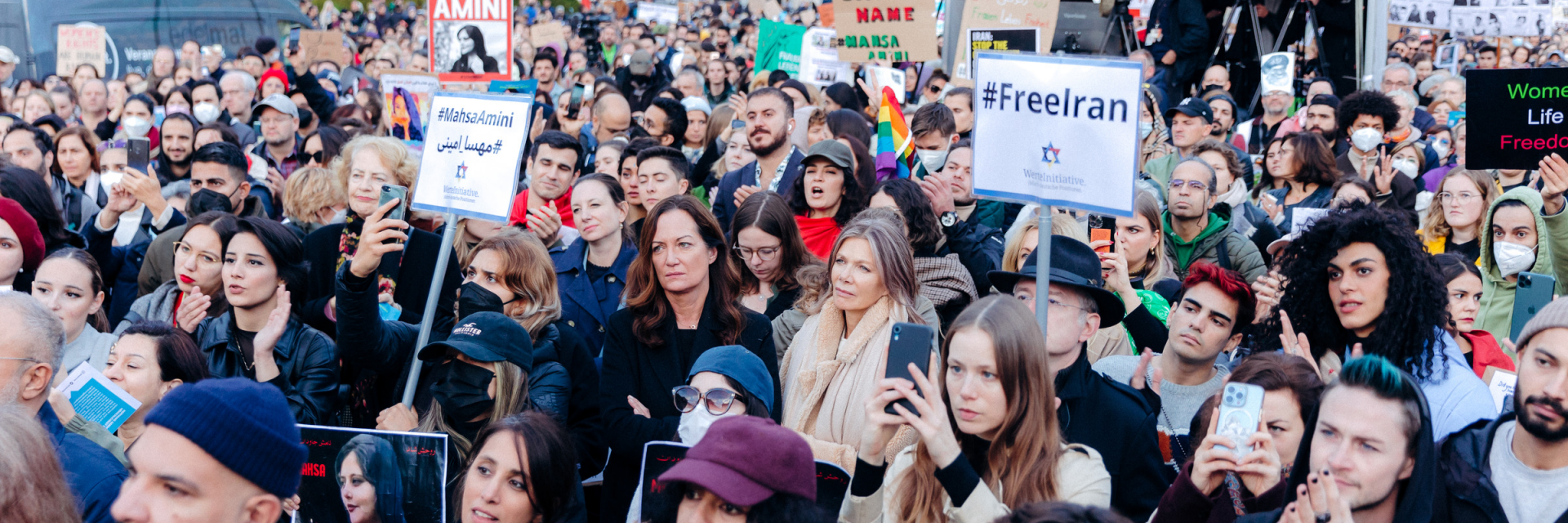20. December 2022 – IRAN
RALLY AT THE BRANDENBURG GATE IN SOLIDARITY WITH THE PEOPLE OF IRAN
“Jin – Jiyan – Azadi, JIN-JIYAN-AZADI” it echoed on Pariser Platz in front of the Brandenburg Gate on September 28th. More than 2000 people came to show solidarity with the people and especially with the women in Iran. Among them were many guests and speakers from society and politics.
The recent protests were triggered by the murder of Jina Mahsa Amini on September 16th in Tehran. The Kurdish woman had not worn her hijab properly, was arrested by the morality police, and abused in custody. So brutally that she died. With today’s rally, we wanted to create a space for people from the Iranian and Kurdish diaspora to share their pain, and a place for all of us to come together in solidarity and hope. Hope for an end to the many years of oppression of the people of Iran and for freedom.


After the opening by Düzen Tekkal, the party leaders of BÜNDNIS 90/Grünen, Ricarda Lang, and Omid Nouripour, come on stage. Ricarda Lang refers to the universality of human rights: “Freedom is not Western, not Eastern, but universal!” – quoting the motto of Iranian women who took to the streets against Khomeini in 1979 to stand up for their rights. Omid Nouripour points out that the stage belongs precisely to Iranian women because they are the spearhead of the revolution in Iran: “Now is the time for men to listen!”
Next to speak is journalist Gilda Sahebi, who makes a powerful appeal to politicians: “You can’t work with a regime like this!” More and more passers-by join the 2000 people who have come to express their grief and anger. A moment that gives everyone goose bumps: when the musician Mentrix together with Nora Tschirner and Tomer perform a version of “Bella Ciao” in Farsi.
Ronya Othmann comes on stage. She is an author and wrote the obituary “For Jina”, “one of the strongest and most touching texts on the subject”, as Düzen Tekkal explains. As Ronya Othmann reads the text, she brings Jina’s story back to mind for everyone – and how senseless her death was. At this point, many in the audience have tears in their eyes.
A subsequent minute of silence ends with “Jin-Jiyan-Azadi” chants. Düzen Tekkal asks Serap Güler, MdB (CDU) to come on stage, who joins the previous speakers and expresses solidarity with the people in Iran. The human rights activist Daniela Sepehri starts her speech in Farsi and then moves on to criticize German foreign policy. After her, Afghan Arezao Naiby takes the stage. She knows the pain of Iranian women very well. She has come to express solidarity with them but also reminds us not to forget the situation of women in her home country.
And then Amir walks on stage. He experienced the oppression by the regime in Iran himself, he grew up there and fled to Germany three years ago. The speech he reads from his smartphone is moving and authentic: “Why should people in Germany care and show solidarity with the people in Iran? An attack on women’s rights is an attack on all human rights. It is not a women’s issue, it is a human issue!”
More Iranians have come to give voice to their anger and grief. FDP politician Bijan Djir-Sarai, MdB, takes the podium, denounces the regime, and demands that more attention be paid to the human rights situation in international relations with Iran.
Is Jina’s death the tipping point for the unjust regime that has been oppressing people for 43 years? Minu Barati talks about how she wishes to see her family in Iran again, something she has been denied for decades. Her father, Mehran Barati, a leading Iranian opposition politician of the Democratic Party of Kurdistan-Iran, narrowly escaped the Mykonos assassination in 1992. In Farsi, he addresses his compatriots, who cheer him loudly.
Also MdB and Federal Minister for Agriculture and Food Cem Özdemir, long-time supporter of HÁWAR.help, takes a clear stand on the human rights situation, and rages against the Mullahs. The last speaker Derya Türk-Nachbaur, MdB (SPD) enters the stage. She speaks of the hopes of women in Iran, and in her concluding sentence encourages us to reflect: “Where would Iranian society be now if it had treated women equally and not oppressed them?”


Düzen Tekkal concludes by thanking all those present and those who helped, as well as our supporters: Anne Großmann, Katharina Kurz, Verena Pausder and Judith Dommermuth. She also motivates us to “keep going and keep disturbing” and promises that HÁWAR.help will not stop supporting the people in Iran.
The rally at the Brandenburg Gate ends with the sound of Kurdish music, sung by Nargis, a Kurdish woman from Iran, and the constant echoing of “Jin, Jiyan, Azadi!”













